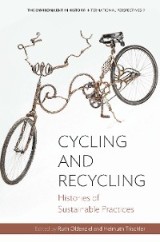Details

Cycling and Recycling
Histories of Sustainable PracticesEnvironment in History: International Perspectives, Band 7 1. Aufl.
|
38,99 € |
|
| Verlag: | Berghahn Books |
| Format: | EPUB |
| Veröffentl.: | 01.12.2015 |
| ISBN/EAN: | 9781782389712 |
| Sprache: | englisch |
| Anzahl Seiten: | 256 |
DRM-geschütztes eBook, Sie benötigen z.B. Adobe Digital Editions und eine Adobe ID zum Lesen.
Beschreibungen
<p> Technology has long been an essential consideration in public discussions of the environment, with the focus overwhelmingly on creating new tools and techniques. In more recent years, however, activists, researchers, and policymakers have increasingly turned to mobilizing older technologies in their pursuit of sustainability. In fascinating case studies ranging from the Early Modern secondhand trade to utopian visions of human-powered vehicles, the contributions gathered here explore the historical fortunes of two such technologies—bicycling and waste recycling—tracing their development over time and providing valuable context for the policy successes and failures of today.</p>
<p> <strong>PART I: INTRODUCTION</strong></p>
<p> <strong><a>Introduction:</a></strong><a> How Old Technologies Became Sustainable: An Introduction</a><br> <em>Ruth Oldenziel and Helmuth Trischler</em><br> <br> <strong>PART II: CYCLING HISTORIES</strong></p>
<p> <strong>Chapter 1. </strong>Use and Cycling in West Africa<br> <em>Hans Peter Hahn</em></p>
<p> <strong>Chapter 2.</strong> The Politics of Bicycle Innovation: Comparing the American and Dutch Human-Powered Vehicle Movements, 1970s—present<br> <em>Manuel Stoffers</em></p>
<p> <strong>Chapter 3. </strong>Scarcity, Poverty, Exclusion: Negative Associations of Bicycle’s Uses and Cultural History in France<br> <em>Cathérine Bertho Lavenir</em></p>
<p> <strong>Chapter 4. </strong>Who Pays, Who Benefits? Bicycle Taxes as Policy Tool of the Public Good, 1890–2012<br> <em>Adri de la Bruhèze and Ruth Oldenziel</em></p>
<p> <strong>Chapter 5. </strong>Monuments of Unsustainability: Planning, Path Dependence, and Cycling in Stockholm<br> <em>Martin Emanuel</em></p>
<p> <strong>PART III: INTERSECTIONS</strong></p>
<p> <strong>Chapter 6. </strong>Bicycling and Recycling in Japan: Divergent Trajectories<br> <em>William Steele</em><br>  <br> <strong>PART IV: RECYCLING HISTORIES</strong></p>
<p> <strong>Chapter 7.</strong> Premodern Sustainability? The Secondhand and Repair Trade in Urban Europe<br> <em>Georg Stöger</em></p>
<p> <strong>Chapter 8.</strong> Waste to Assets: How Household Waste Recycling Evolved in West Germany<br> <em>Roman Köster</em></p>
<p> <strong>Chapter 9. </strong>Ecological Modernization of Waste-Dependent Development? Hungary’s 2010 Red Mud Disaster<br> <em>Zsuzsa Gille</em></p>
<p> <strong>Chapter 10. </strong>“<em>Der Kampf um den Abfallstrom</em>.” Conflict and Contestation in Re-Valuing E-Waste in Germany<br> <em>Djahane Salehabidi</em></p>
<p> <strong>PART IV: REFLECTIONS</strong></p>
<p> <strong>Chapter 11. </strong>Can History Offer Pathways to Sustainability?<br> <em>Donald Worster</em></p>
<p> <strong>Chapter 12. </strong>History, Sustainability, Choice<br> <em>Robert Friedel</em></p>
<p> Contributors<br> Select Bibliography<br> Index</p>
<p> <strong><a>Introduction:</a></strong><a> How Old Technologies Became Sustainable: An Introduction</a><br> <em>Ruth Oldenziel and Helmuth Trischler</em><br> <br> <strong>PART II: CYCLING HISTORIES</strong></p>
<p> <strong>Chapter 1. </strong>Use and Cycling in West Africa<br> <em>Hans Peter Hahn</em></p>
<p> <strong>Chapter 2.</strong> The Politics of Bicycle Innovation: Comparing the American and Dutch Human-Powered Vehicle Movements, 1970s—present<br> <em>Manuel Stoffers</em></p>
<p> <strong>Chapter 3. </strong>Scarcity, Poverty, Exclusion: Negative Associations of Bicycle’s Uses and Cultural History in France<br> <em>Cathérine Bertho Lavenir</em></p>
<p> <strong>Chapter 4. </strong>Who Pays, Who Benefits? Bicycle Taxes as Policy Tool of the Public Good, 1890–2012<br> <em>Adri de la Bruhèze and Ruth Oldenziel</em></p>
<p> <strong>Chapter 5. </strong>Monuments of Unsustainability: Planning, Path Dependence, and Cycling in Stockholm<br> <em>Martin Emanuel</em></p>
<p> <strong>PART III: INTERSECTIONS</strong></p>
<p> <strong>Chapter 6. </strong>Bicycling and Recycling in Japan: Divergent Trajectories<br> <em>William Steele</em><br>  <br> <strong>PART IV: RECYCLING HISTORIES</strong></p>
<p> <strong>Chapter 7.</strong> Premodern Sustainability? The Secondhand and Repair Trade in Urban Europe<br> <em>Georg Stöger</em></p>
<p> <strong>Chapter 8.</strong> Waste to Assets: How Household Waste Recycling Evolved in West Germany<br> <em>Roman Köster</em></p>
<p> <strong>Chapter 9. </strong>Ecological Modernization of Waste-Dependent Development? Hungary’s 2010 Red Mud Disaster<br> <em>Zsuzsa Gille</em></p>
<p> <strong>Chapter 10. </strong>“<em>Der Kampf um den Abfallstrom</em>.” Conflict and Contestation in Re-Valuing E-Waste in Germany<br> <em>Djahane Salehabidi</em></p>
<p> <strong>PART IV: REFLECTIONS</strong></p>
<p> <strong>Chapter 11. </strong>Can History Offer Pathways to Sustainability?<br> <em>Donald Worster</em></p>
<p> <strong>Chapter 12. </strong>History, Sustainability, Choice<br> <em>Robert Friedel</em></p>
<p> Contributors<br> Select Bibliography<br> Index</p>
<p> <strong>Ruth Oldenziel</strong> is Professor of American and European History at the Eindhoven University of Technology and visiting scholar at the LMU Rachel Carson Center for Environment and Society. Her books include <em>Consumers, Users, Rebels: The People Who Shaped Europe</em> with Mikael Hård; <em>Cold War Kitchen</em> with Karin Zachmann;<em> Gender and Technology</em> with Nina Lerman and Arwen Mohun; and <em>Making Technology Masculine</em>.</p>


















